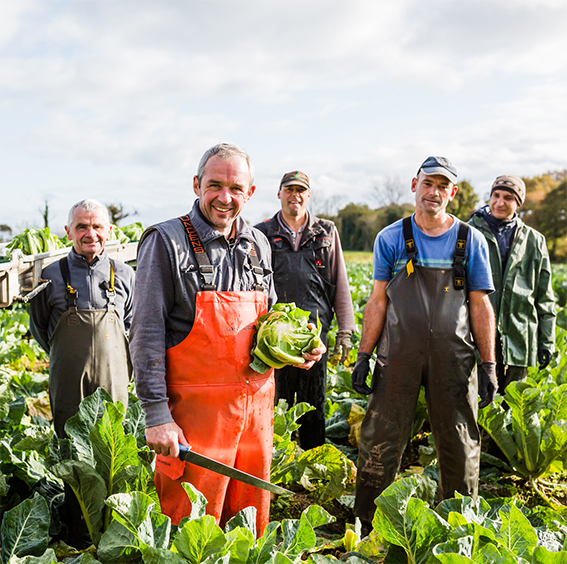According to the 2022 edition of Panorama des entreprises coopératives, there are 2,200 agricultural co-ops located throughout France, with 300,000 member farmers. Agricultural co-ops represent 40% of turnover in the French agri-food industry.
For 20 years, Pouliquen has been an official distributor for the Prince de Bretagne brand, which comprises three of Brittany’s largest vegetable co-ops: SICA Saint-Pol-de-Léon (Finistère), Les Maraîchers d’Armor (Côtes-d’Armor) and Terres de Saint Malo (Ille-et-Vilaine), representing over 1,300 growers.
How do these agricultural co-ops work? What advantages do they offer growers? To find out, we went to meet father and son Paul and Emmanuel Le Dantec, growers in Pleubian (Côtes-d’Armor) and members of the Les Maraîchers d’Armor co-op. Over two generations, the pair has witnessed the evolution of farming practices in Brittany.
Pouliquen: How long has your family been in the farming business?
Paul Le Dantec (father): We’ve been working the same farm since 1850. The farming model that I followed, at least at the outset, was that of my father and my grandfather before him: 15 dairy cows, a few pigs, and the main crop at the time was new potatoes, which we grew on 25 hectares.
Pouliquen: How was production organised at the start of your career?
PLD: We didn’t have any employees, but our farm was one of the largest. We had some equipment and a tractor. We worked the soil for the small farms in the area, and in exchange, the farmers would come and help us with planting, hay-making, harvesting and bringing in the crops.
Pouliquen: When did the farming model change, and why?
PLD: It began to change in the ’60s. We started growing cauliflower and artichokes, while continuing with potatoes and dairy cows. I took over the farm from my parents in 1974. I didn’t keep the dairy cows for very long, and began to raise steers instead. Meat was selling well at the time, and the animals provided manure for the fields. I stopped raising them in the ’90s after the mad cow crisis.
Pouliquen: Emmanuel, when and how did you take over from your father?
Emmanuel Le Dantec (son): I started as a family helper in 1998. At 45, my father was too young to hand over the business. Two and a half years later, I took over 12 hectares, leaving 28 to my father.
Pouliquen: What crops were you growing at the time?
ELD: More or less the same thing that we grow now: Camus artichokes at the beginning, then Castel and Petit Violet—mainly for the Italian market—and later, Cardinal artichokes. Then cauliflower, broccoli, and new potatoes. These days, I also produce grain crops.
Pouliquen: Could you tell me about the early days of the Les Maraîchers d’Armor co-op?
PLD: Les Maraîchers d’Armor began as the UCPT, Union des Coopératives de Paimpol et Tréguier. This co-op was created in 1974 to access major markets, especially after the serious crises of the 1960s. The goal was to unite the entire offer and structure our local activities. The creation of the UCPT allowed us, together with SICA Saint-Pol-de-Léon (the Finistère co-op) and Terres de Saint-Malo (the Ille-et-Vilaine co-op), to create CERAFEL, which manages the whole thing. And then the Prince de Bretagne brand, shared by these three regions.
Pouliquen: How does the co-op work today?
ELD: There’s a board of directors with a president and twenty administrators who are all farmers and co-op members. Each vegetable is managed by a committee of fifteen farmers representing the packing stations. Some representatives of these committees also participate in the regional organisation, where they share their department’s perspective with the others and make decisions regarding specifications and marketing. Besides the auction house, they also manage contracts, tenders and telematics.
Pouliquen: Emmanuel, why did you choose to become a member of the co-op when you entered the business?
ELD: It was something I didn’t even question. The agricultural co-op allows me to access markets that I couldn’t approach as an independent producer. We’re in the packaged vegetable market. The co-op monitors the market and tells us how to proceed, for example concerning packaging. It also assists growers in obtaining certifications. Nowadays, if you’re not Global Gap, you can’t access the German market. If you aren’t certified HEV, you can’t sell to certain supermarket chains in France. The co-op has been there to help us through these changes. Also, in a co-op, you’re not responsible for setting the price, but you can be sure that you’ll be paid.
Pouliquen: What would you say is the social role of the agricultural co-op today?
ELD: When we deliver vegetables at the end of every day, we meet with other growers, which gives us a chance to talk. This is something important that doesn’t happen anywhere else.
Pouliquen: To wrap up this interview, could you tell us what advice you’d offer a young farmer just starting out?
ELD: It’s a wonderful profession! There are hard days, days when the prices aren’t so good, and better days, which are more reassuring.
PLD: To join the co-operative! Even if the organisation can sometimes seem a bit taxing. People complain during the hard times, but things would be even harder without the co-op. It gives us access to the industry and manages the market. We couldn’t do it on our own!
Interview by Élodie Cloarec
—-
Based on the north coast of Brittany, the Pouliquen group, a partner of Prince de Bretagne, enjoys close proximity to hundreds of producers.
This proximity enables the company to build relationships of trust with market gardeners and to offer you products of the highest quality, both in terms of freshness and flavour.
It also ensures perfect product traceability.

